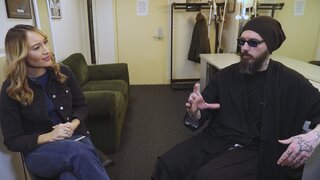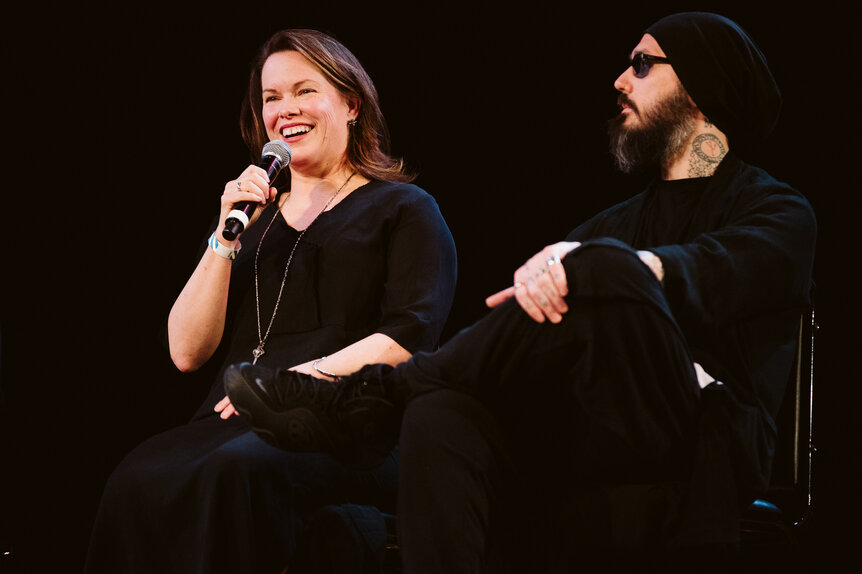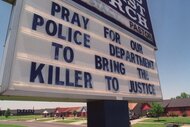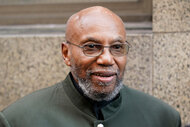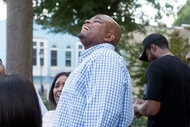Create a free profile to get unlimited access to exclusive videos, breaking news, sweepstakes, and more!
He 'Reminded Me Of Myself': How A True Crime Doc Led To One Woman Marrying A Death Row Inmate
"There was something about Damien that resonated with me," said Lorri Davis of watching the "Paradise Lost" documentary, which led her to meet future husband Damien Echols.
It’s probably fair to say that Lorri Davis didn’t think that she’d fall for her future husband while watching a documentary about three convicted murderers, let alone a documentary she didn’t even really want to see.
But that’s exactly what happened when she went to a screening of the 1996 documentary “Paradise Lost: The Child Murders at Robin Hood Hills.”
The film focused on what it perceived as the injustice in the “West Memphis Three” case, a controversial case where three teenagers were convicted of murdering three 8-year-old boys.
The bodies of the three children — Steve "Stevie" Branch, Christopher Byers, and Michael Moore— were discovered in a West Memphis, Arkansas ditch in 1993. Damien Echols, then 18, Jason Baldwin, then 16, and Jessie Misskelley, then 17, were arrested and convicted of killing the young boys. The teens were described as social outcasts who liked metal music, and their controversial trial focused on Echols' interest in paganism and Stephen King books. The apparent “Satanic Panic” (a fear in the 1980s and 1990s that Satanism would infect society) element of the case was the depicted in the film, which was directed by Joe Berlinger.
At a Death Becomes Us panel entitled “Wrongfully Accused,” held on Saturday in New York City as part of the multi-day true crime festival, both Berlinger and Davis were present to discuss the case.
“I wasn’t into true crime,” Davis, who eventually married Echols, admitted during the panel. “I just wasn’t interested in the topic.”
But once she got seated in the theater and started watching it, she said she could instantly relate. Originally from West Virginia and raised in a Christian household, the conservative town of West Memphis and the way it perceived the teens in the case as devil worshippers got to her — and one of the teens in particular really struck her.
“There was something about Damien that resonated with me,” she said. “He was so young but he was so intelligent and he just reminded me of myself because I was always the outsider in my small town.”
After the screening concluded, Davis said she became extremely upset.
“It was so obvious something went horribly wrong down there,” she said. “I just felt this need to help.”
Davis, a New York City architect at the time, sent Echols a letter, and hundreds of letters later, she moved down to Arkansas, not even telling her parents about why she was moving. They wed in 1999.
In an interview with Biography, Echols said," I knew from the very first letter that this was someone completely unlike anyone I had ever known. She would see things that I guess everyone else would look at as mundane everyday things, but the way she saw them made them seem magical, the opposite of mundane, and it made me want to be able to see the world that way, to see the world through her eyes, to be a little more like her, I guess."
“It was just a current, it was like a river and I was in it and that was it,” Davis said at the panel.
Even though they were married, it took several years for them to be together in the flesh. During that time, Davis fought hard for her husband’s release. She raised money for his defense team and sought out celebrity support, even co-producing another documentary called “West of Memphis,” with Peter Jackson from the "Lord of the Rings" trilogy.
At a separate panel for the event, Echols recalled how Davis dug through people's trash to find the DNA that actually matched the ones found on the victims' bodies.
At that panel, Echols said, "It never occurred to us that I might die in there, that we might not be together one day. It helped keep my sanity. I had this feeling like, I'm OK now, I'm safe now, things might get hard... but they can't murder me now."
Echols and his friends were not released from prison until 2011, after entering an Alford plea. An Alford plea allows someone to maintain their innocence, but acknowledges the prosecution has enough evidence to convict them. All were credited for time served.
Davis and Echols now live together in Harlem.
